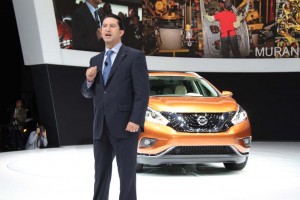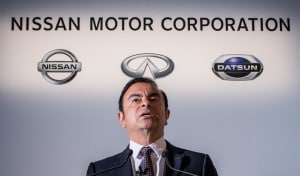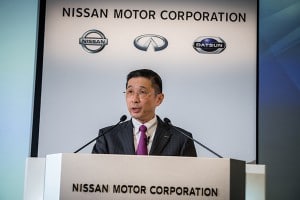
José Muñoz, Nissan’s former chief performance officer, is one of the many senior executives who have left the company in recent months.
The unexpected departure of José Muñoz, one of the highest-ranking Westerners working for Nissan Motor Co., is raising new concerns about what several well-placed company insiders fear is becoming a purge of foreigners linked to the automaker’s former chairman Carlos Ghosn.
Muñoz, who until recently was thought to be in the running for Nissan CEO, tendered his resignation on Friday. That came barely a week after he was put on leave from his regular job and assigned to deal with “special tasks,” a growing investigation inside the company looking for financial and other ethical irregularities.
The concern raised by several sources who spoke to TheDetroitBureau is that in its search to uncover potential criminal activity by Ghosn and others, Nissan may be setting in motion what one described as a “bloodbath.”
(Top Nissan exec “resigns.” Click Here to find out why.)
The 64-year-old Ghosn was arrested on November 19th shortly after landing in his corporate jet at Haneda Airport in Tokyo. He has been accused of a variety of financial misdeeds, including the hiding of $44 million in deferred income. On Friday, the Brazilian-born executive was indicted for the second time for alleged “breach of trust,” but Japanese prosecutors also filed charged against his American colleague Greg Kelly, as well as Nissan itself.
The automaker responded with the latest in a series of broadsides against Ghosn, the man credited with engineering a bailout that saved it from bankruptcy two decades ago. It also said in a statement “Nissan does not in any way tolerate such misconduct,” something its ongoing investigation is supposed to be rooting out. But numerous outsiders, as well as several well-positioned insiders who spoke with TheDetroitBureau, worry that the investigation – along with the allegations against Ghosn – may be more political than criminal.
Ghosn himself implied that during a brief court hearing on Tuesday, his first public appearance since his arrest, declaring, “I have been wrongly accused and unfairly detained based on meritless and unsubstantiated accusations.”
(Carlos Ghosn has been indicted again. Click Here for the story.)
As TheDetroitBureau previously reported, many are questioning Ghosn’s arrest and lengthy detention, raising concerns that he may have been caught up in a drive by Nissan to diminish the power of Renault, the French automaker that engineered Nissan’s 1999 bailout and which holds a 43.4% stake in its Japanese alliance partner.
Nissan CEO Hiroto Saikawa has repeatedly criticized the man once seen as his mentor, but has also expressed a desire to shift the balance of power in the Renault-Nissan-Mitsubishi Alliance. The French carmaker currently has the right to unilaterally name Nissan board members and senior executives. It is widely believed that Ghosn was traveling to Japan when arrested to fire Saikawa and replace him with an executive more palatable to Renault.
Now, however, it is Ghosn that has been ousted as chairman of Nissan, as well as chairman of Mitsubishi, the smaller automaker that he directed Nissan to bail out in 2016.
“Once you get new management in, invariably, things begin to shake up,” said Joe Phillippi, a veteran auto analyst and head of AutoTrends Consulting. The crisis surrounding the prosecution of Ghosn could give Nissan executives, starting with CEO Saikawa “an opportunity to clean house.”
A former Nissan executive who worked in Japan and who remains close to the automaker was far more blunt. He said he sees the departure of Spanish-born Muñoz as the start of what he termed “a bloodbath.”
Since November 2016, Muñoz had been serving as Nissan’s Chief Performance Officer, a job that seemed well-suited for a man credited with driving the automaker to a solid number one spot during his tenure heading Nissan Mexicana. He became a top Ghosn lieutenant and was subsequently appointed head of North American operations.
“He had a tough assignment but drove as hard as anyone I’ve ever seen,” said an executive reporting to Muñoz in the U.S.
That included helping Ghosn meet the goals of the Power 88 corporate plan put in place in 2011: an 8% global market share and an 8% operating profit margin. While Nissan fell short on a global basis, Munoz briefly drove the company’s U.S. operations up to a 10% share. That fell back to 9.2% in 2017, the year after he took on his new job, but he was still given credit for setting motion the strategy that deliver record U.S. sales of 1.59 million.
(Click Here for our coverage of Ghosn’s first court appearance.)
The first sign that something might be wrong came last week when Muñoz proved a no-show for the events Nissan had planned at the Consumer Electronics Show in Las Vegas. That included the debut of an all-new version of the Leaf battery-electric vehicle. While it has been the world’s best-selling BEV, sales have been sliding even as Tesla has gained rapid momentum with its Model 3. The new Leaf is aimed at shoring up its position by boosting range to 226 miles, or triple what it first offered in 2011.
It subsequently came out that Muñoz had been called to Japan to work on the ongoing investigation that Nissan claimed had uncovered evidence of Ghosn’s corruption. The executive apparently fretted that he was not being seen as cooperative enough with the probe, according to a letter Muñoz sent to colleagues that was attained by trade publication Automotive News.
“Unfortunately, Nissan is currently involved in matters that have and will continue to divert its focus. As I have repeatedly and recently made clear to the company, I look forward to continuing to assist Nissan in its investigations,” Muñoz wrote, adding that he decided to leave the company and take “some period of serious contemplation.”
A source close to the Nissan board told TheDetroitBureau that Muñoz was concerned that the ongoing investigation was intended to do more than just look into corruption involving Ghosn and Kelly, however.
“They have 100 people assigned to dig up dirt on people and pressure them to either leave under disgrace or turn state witness against Ghosn,” said the industry veteran who has spent decades working on both sides of the Pacific. “Jose wasn’t going to do that. He felt they were going to fire him. To retain his dignity and to avoid a public fight he went ahead and quit.”
Several sources have indicated that Muñoz wasn’t the only Nissan veteran who has been concerned about the handling of the Ghosn affair.
On January 9, Toshiyuki Shiga, former Nissan Chief Operating Officer in 2005 who has continued serving on the Nissan board, announced he would retire at the end of his current term. Shiga issued a formal statement that, “I think it’s time to make room for the next generation.” But several sources have said Shiga privately expressed his concerns about Ghosn’s arrest and the way Nissan had handled the case.
Efforts to reach Shiga by TheDetroitBureau have not been successful.
And when asked about the circumstances of its Chief Performance Officer, the automaker responded with a terse note saying, “José Muñoz has elected to resign from Nissan Motor Company, effective immediately.” A senior spokesperson was not available while “traveling.”



